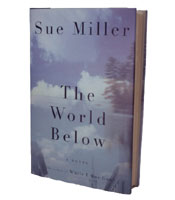
To say that Sue Miller’s novels have the same relationship to serious literature that cookbooks do is not necessarily to underestimate her novels – or, for that matter, cookbooks. Cookbooks, like all nonliterary genres, enjoy what you could call the advantage of limitedness: The best of them provide, with maximum efficiency and little fuss over aesthetic niceties, the very limited kind of information (how to prepare Thai noodle soups, say) that readers need. The best of Sue Miller’s books do the same thing: Works like While I Was Gone or The Good Mother give their readers the information they want, which tends to be that middle-aged women are wise with the wisdom of the ages, and that men are flawed and manipulative. There may be cookbooks that are more than just containers of information for those with a yen to fricasse; but it seems safe to say that The World Below isn’t going to interest anyone who isn’t already impressed with her own wisdom.
At 52, Catherine Hubbard, a Bay Area schoolteacher with three kids and two ex-husbands to her credit, feels, not unreasonably, that she has “reached the end of some kind of road.” Just in the nick of time, she learns that she has inherited the family homestead back in Vermont – the house where she grew up after the suicide of her mother and where she was nurtured by a beautiful, wise-with-the-wisdom-of-the-ages grandmother, Georgia Rice Holbrooke, a country doctor’s wife. To Cath and anyone who regularly watches Lifetime TV movies, as I do, the unexpected inheritance seems to offer “a kind of answer,” and so Miller’s heroine does the only possible thing, which is to head back east, move into the old house, and immediately discover Georgia’s secret diaries locked in a trunk in a musty attic.
The diaries, which Cath avidly reads when she isn’t having clunkily introduced flashbacks to her own troubled past (“I remembered a moment from the spring of that first year”), reveal that Georgia’s life and marriage were more complicated and compromised than Cath had realized; these revelations, we’re meant to understand, give Cath the strength to resume her life. If the revelations themselves come off as oddly anticlimactic and artificial to readers, if not to Cath or her creator (some premarital sex, an effortfully contrived misunderstanding about the meaning of the phrase “damaged goods,” on which, we’re meant to believe, Georgia’s marriage to a much older man was based), the diaries do provide Miller with a chance to interweave Cath’s story with that of her grandmother – a tried-and-true structural recipe if ever there was one.
The clanking noises generated by the machinery of Miller’s laboriously achieved double plot would be easier to ignore (or forgive) if so much of this book weren’t so obviously contrived. Miller is one of those authors who not only introduces portentous symbols, such as the underwater New England village to which the title refers (submerged as a result of the creation of a reservoir), but goes on to tell you what they mean: “It’s a fascinating saga,” someone says of the underwater town – and, of course, we’re meant to think the same of the way that Georgia’s story shadows Cath’s. “The idea of that submerged lost history … full of its own compelling detail.” Unfortunately, this is the kind of novel in which worldly parisiennes wearily say things like “You are young, my dear.” Such details are anything but compelling.
But then, the whole point of books like Miller’s is not to challenge or complicate your view of the world, as a serious novel would, but to tell you what you already think you know about the world (which is what a genre novel – a romance novel, say – does): that people who live in Paris are blasé, or that men objectify women and their sexuality, etc., etc. Writing about women’s experience needn’t be this way, as Miller herself seems to know. There’s a scene here in which the teenage Cath and her grandfather are talking about books; Grandpa Holbrooke recommends the English novelist Penelope Fitzgerald. “Such witty economy,” he murmurs appreciatively. “A hard act to pull off.” I’ll say. After pages and pages of piled-on revelations and climaxes that produce insights no more earth-shaking than what you find on bumper stickers (“How temporary man is. Man, or life.”), the sudden, bracing reference to a serious woman novelist reminds you that the difference between bona fide literature and genre books is the difference between – well, between serious cuisine and fast food. The one, like Fitzgerald, nourishes and edifies; the other – I won’t mention any names, but let’s just call it that other, parallel kind of fiction, that literary world below – is merely filling.
The World Below
By Sue Miller.
278 pages; Alfred A. Knopf; $25.